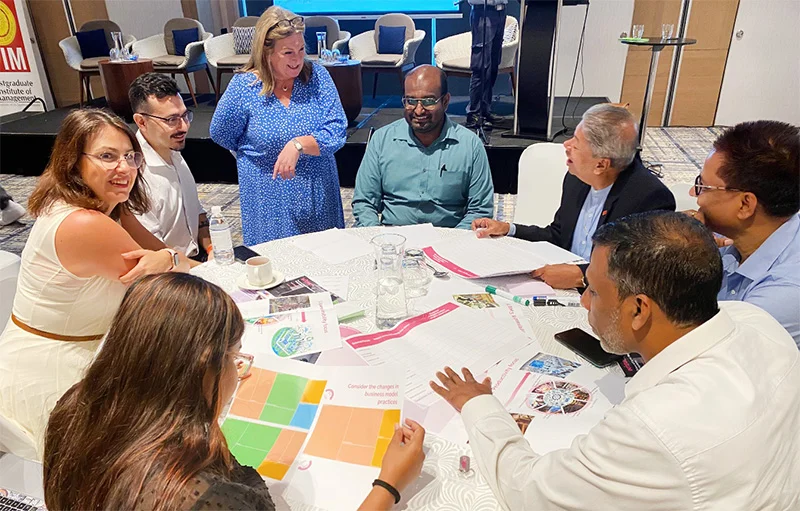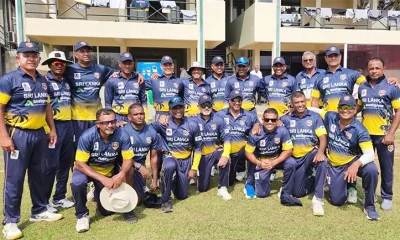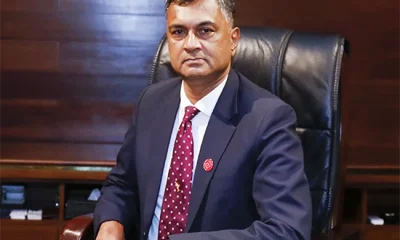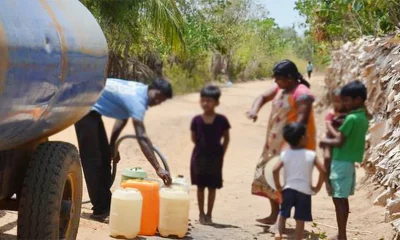Business
LOLC Group posts Rs. 57 billion in PBT

Ishara Nanayakkara, Deputy Chairman of LOLC Group with Group Managing Director/CEO of LOLC Group, Kapila Jayawardena
A record-breaking performance
Sri Lanka’s most valuable and globally diversified financial conglomerate, the LOLC Group, posted a record-breaking performance for the financial year ending 31st March 2021, achieving unprecedented bottom line results of Rs. 57Bn in Profit Before Tax (PBT), and a Profit After Tax (PAT) of Rs. 53Bn – a first for any corporation in the country.
By achieving profits on this massive scale in the history of Sri Lanka’s corporate world, the Group once again consolidated its position as the top most profitable diversified corporate in the country, three years in a row – establishing LOLC as one of the largest Micro and Small & Medium Enterprises (MSME) platforms in the world.
This stunning performance by LOLC resulted in a Rs. 28Bn being recorded as Profits Attributable to the Equity Holders of the Parent company. The Group results denote an impressive Earnings Per Share of Rs. 59.01 compared with Rs. 22.93 recorded in the previous year. Whereas, the total comprehensive income was Rs. 81Bn out of which Rs. 37Bn is attributable to the Equity Holders of the Parent company. Furthermore, the total attributable comprehensive income per share was Rs. 77.84. The resultant Net Assets Value per Share as at the year-end was Rs. 286.23 compared to Rs. 194.72 reported last year, demonstrates the exceptional value creation by the Group during the concluded financial year.
The story of LOLC’s rise into an elite blue-chip within a span of 40 years is nothing short of awe-inspiring, surpassing competitors who have been in existence for over a century. A pioneering leasing company established in the year 1980, in collaboration with ORIX Corporation of Japan and International Finance Corporation (IFC), LOLC, revolutionized the future of MSMEs in Sri Lanka and rose in stature as Sri Lanka’s largest Non-Banking Financial Institution (NBFI). Having established a high performance microfinance business model, LOLC rapidly exported its expertise to global markets such as Cambodia, Myanmar, Indonesia, Philippines, and Pakistan in Asia; as well as Zambia and Nigeria in East and West Africa, bringing prosperity to people at the bottom of the pyramid. In addition, the Group has established its footprint in the Maldives and Sierra Leone in the arena of Non-Financial Services.
In Sri Lanka, the LOLC Group diversified into agriculture and plantations, leisure, renewable energy, construction, manufacturing and trading, information services, as well as research and innovation over and above its flagship financial services. All of these businesses recorded an upward trend in profitability in 2020/21, despite the adverse effects of COVID-19 being felt by Sri Lanka’s economy through 2020, coupled with weak GDP growth in the preceding year. Despite the global economic downturn experienced during the period, a strong pipeline of multilateral and bilateral funding has been available to LOLC and its operating companies both locally and globally – a testimonial to the confidence these institutions have placed in the LOLC Group due to its strong and unblemished track record and the potential for growth even during turbulent times.
Business
CEB urged to revise Draft Long Term Generation Expansion Plan, in view of renewable energy needs

By Ifham Nizam
The Public Utilities Commission of Sri Lanka (PUCSL) has instructed the Ceylon Electricity Board (CEB) to revise its Draft Long-Term Generation Expansion Plan (LTGEP) 2025-2044, incorporating more robust projections for renewable energy and battery storage, while also reassessing LNG infrastructure and procurement strategies.
The Island Financial Review reliably learns PUCSL Director General Damitha Kumarasinghe emphasized the need for “more robust and realistic cost assumptions for Renewable Technologies and Battery Energy Storage Systems (BESS).”
The Commission stressed that BESS should be valued not just as a renewable integration tool but also for its potential to mitigate power shortages.
The directive also calls for revisions in LNG infrastructure planning, including “a comprehensive analysis covering LNG fuel cost calculation, infrastructure development, procurement contracting options, and risks associated with supply and procurement.” PUCSL has specifically highlighted the importance of evaluating the financial and economic feasibility of a natural gas pipeline from Kerawalapitiya to Kelanitissa.
Kanchana Siriwardena, Deputy Director General – Industry Services, reinforced the Commission’s stance on renewable energy, stating that “further reductions in renewable energy curtailment should be explored by incorporating more BESS.”
The PUCSL’s instructions also mandate incorporating clauses from the Memorandum of Understanding (MoU) with Petronet India, which includes a temporary LNG supply for the Sobadhanavi Plant. The revised LTGEP must also factor in infrastructure costs related to the Floating Storage Regasification Unit (FSRU) and pipeline networks as part of the overall LNG cost calculation.
The CEB is expected to resubmit the revised plan for PUCSL’s approval, ensuring alignment with Sri Lanka’s long-term energy security and sustainability goals.
The PUCSL directive also calls for a comprehensive evaluation of various LNG procurement options and associated risks. These include:
LNG infrastructure development and expansion
Contracting options for LNG procurement
Risks related to LNG supply and procurement stability
Robustness of natural gas demand calculations
Economic feasibility of the proposed natural gas pipeline from Kerawalapitiya to Kelanitissa, given the low plant factors of power stations at Kelanitissa.
Business
Nations Trust Bank ends 2024 with strong performance, achieving 24% ROE

Nations Trust Bank PLC reported strong financial results for the twelve months ending 31st December 2024, achieving a Profit After Tax (PAT) of LKR 17 Bn, up 46% YoY.
Nations Trust Bank, Director & Chief Executive Officer, Hemantha Gunetilleke, stated, “The Bank’s performance for the twelve months ending 31st December 2024 showcases our continued growth and expansion across diverse customer segments. Our solid capital position, strong liquidity buffers, effective risk management frameworks, and steadfast commitment to service excellence and digital empowerment remain the key drivers of our success.”
Improvements in the macro-economic environment and successful management of the Bank’s credit portfolio resulted in total impairment charges decreasing by 69% and the Net Stage 3 ratio reducing to 1.6%.
The Bank’s financial performance is supported by its strong capital buffers, with Tier I Capital at 21.47% and a Total Capital Adequacy Ratio of 22.66%, well above the regulatory requirements of 8.5% and 12.5%, respectively.
A strong liquidity buffer was maintained with a Liquidity Coverage Ratio of 320.56% against the regulatory requirement of 100%.
The Bank reported a Return on Equity (ROE) of 24.22%, while its Earnings Per Share for the twelve months ending 31st December 2024 increased to LKR 50.82, against LKR 34.70 recorded during the same period last year.
Nations Trust Bank PLC serves a diverse range of customers across Consumer, Commercial and Corporate segments through multi-channel customer touch points spanning both physical and digital. The Bank is focused on digital empowerment through cutting-edge digital banking technologies, and pioneered FriMi, Sri Lanka’s leading digital banking experience. Nations Trust Bank PLC is an issuer and sole acquirer of American Express Cards in Sri Lanka with market leadership in the premium segments.
Business
Modern Challenges and Opportunities for the Apparel Industry: JAAF drives industry dialogue

The Joint Apparel Association Forum (JAAF), in collaboration with Monash Business School and the Postgraduate Institute of Management (PIM) successfully hosted the International Conference on the Apparel Industry 2025 recently in Colombo. This was the second time the event was held, following its inaugural edition in 2018, as part of JAAF’s commitment to fostering dialogue and collaboration within the global apparel sector.
Themed “Modern Challenges and Opportunities for the Apparel Industry”, the three-day event brought together industry leaders, academics, and sustainability experts to discuss pressing issues such as ESG (Environmental, Social, and Governance) compliance, circular economy strategies, technological advancements, and workforce transformation.
A key highlight of the event was the panel discussion on “Current Actions and Their Impact on ESG-Related Outcomes in the Apparel Industry,” featuring:
Felix A. Fernando – CEO, Omega Line Ltd.
Nemanthie Kooragamage – Director Group Sustainable Business, MAS Holdings
Gayan Ranasinghe – Control Union,
Chamindry Saparamadu – Director General/CEO, Sustainable Development Council
Pyumi Sumanasekara – Principal Partner, KPMG Sri Lanka
Discussions emphasized how Sri Lanka’s apparel industry is adapting to global ESG standards, incorporating sustainable production methods, and aligning with evolving regulatory frameworks.
-

 Business3 days ago
Business3 days agoSri Lanka’s 1st Culinary Studio opened by The Hungryislander
-

 Sports4 days ago
Sports4 days agoHow Sri Lanka fumbled their Champions Trophy spot
-

 Sports7 days ago
Sports7 days agoSri Lanka face Australia in Masters World Cup semi-final today
-

 News7 days ago
News7 days agoCourtroom shooting: Police admit serious security lapses
-

 News7 days ago
News7 days agoUnderworld figure ‘Middeniye Kajja’ and daughter shot dead in contract killing
-

 News6 days ago
News6 days agoKiller made three overseas calls while fleeing
-

 News5 days ago
News5 days agoSC notices Power Minister and several others over FR petition alleging govt. set to incur loss exceeding Rs 3bn due to irregular tender
-

 Features4 days ago
Features4 days agoThe Murder of a Journalist




















